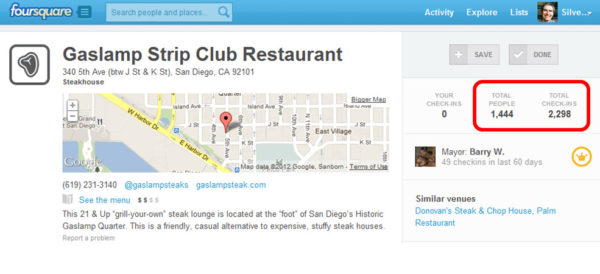Are Check-Ins A Local Ranking Factor?
Check-in services have been one of the few Web 2.0 concepts to tightly combine location data with social media interactions, but it has not been clear if such services convey distinct local ranking benefit beyond the sort of citational reference provided by general online business directories. However, there are some good reasons to believe check-ins […]
Check-in services have been one of the few Web 2.0 concepts to tightly combine location data with social media interactions, but it has not been clear if such services convey distinct local ranking benefit beyond the sort of citational reference provided by general online business directories. However, there are some good reasons to believe check-ins may be unique popularity signals for Google local search.
Google’s blog post on how local search ranking works stated that they use three primary signals for rank determination: Relevance, Prominence and Distance. Businesses have little control over Distance factors, such as their location in relation to searched placenames or to the geolocation of searchers.
Businesses also may be limited in Relevancy factors as well, since once you’ve incorporated your main keywords in your website and online profiles, and selected appropriate business categories, you may not be able to become any more relevant than you already are for a term. But, there can be a great deal of variability in terms of Prominence.
In attempting to understand what Google is evaluating to determine Prominence, it may be useful to think of it as “relative popularity”. If two businesses were to have essentially identical relevancy and distance factors, what sorts of things would Google algorithmically asses to determine which one should be listed first?
In the regular keyword rankings, the Google PageRank algorithm was initially based upon using the numbers of links pointing to a particular page, and their originating pages’ relative popularity, in order to compute a ranking value for the page in question.
Google likely still uses the PageRanks of businesses’ websites in calculating their rankings, along with other popularity signals such as “citations” — the numbers of times when the business and its address or phone number is mentioned in various places.
Yet, Google is ever on the hunt for other signals which might indicate relative popularity (particularly ones which are less easy to artificially manipulate).
For this reason, experienced SEOs suspect Google could be counting things like Facebook shares or “likes” and Google Pluses. Their “PlaceRank” patent hints at similar types of signals which could be used for local rankings as well.
So, this is where check-in services enter the picture. If you look at the data registered for locations by the most-popular check-in service, foursquare, you’ll see some metrics that would likely be very attractive for Google local search engineers:
The total number of people who’ve checked in at a location, and the total number of check-ins associated with it are great indicators of how popular it may be.
Check-ins could also be relatively difficult to game, so the data could be more trustworthy and indicative of actual human interactions compared to many other signals.
foursquare is not the only check-in service, of course — another with a compellingly huge potential usership is Facebook, and it has similar data associated with places:
(It may be worth noting that another top check-in service, Gowalla, was acquired by Facebook in late 2011. So, we might conclude that Facebook will be serious about the service longterm, despite their slightly muddied progress in handling local businesses and place pages.)
It’s one thing to predict that Google would be interested in check-in data, and quite another to assume that they have access to it. (Google has complained before of being unable to spider some of Facebook’s data.)
The check-in applications are heavily based upon proprietary mobile apps, and Google would either need some sort of SOA data feeds into it, or it would need to be published on webpages that could be spidered.
It doesn’t take much checking in the SERPs to find that Google can indeed access this data — the location pages from foursquare and Facebook are spidered by Googlebot and the numbers of people and check-ins can be interpreted, since they are showing up in the page Previews:
One indication that Google is taking check-ins seriously is that they had earlier rolled-out their own check-in service, Latitude, in 2009, and they’ve continued to develop it in clear imitation of foursquare — on Monday of this past week, they added a points system and Leaderboard for it.
It may not ever be possible to know for certain if Google is using quantitative check-in data for calculating rankings along with all of their other factors. As Danny Sullivan has noted before about this kind of data, “correlation isn’t causation“.
We might reasonably predict that businesses with greater check-in numbers would likely also have higher rankings, because they are more popular and there are also other signals of popularity that Google could be using in their algorithms.
But, check-ins are obviously the very sort of data that Google Local engineers would want to use for ranking determinations. Googlebot can spider webpages containing that data, and it could record and use that data. Google’s ongoing development indicates that they take this sort of service seriously, too.
For me, this is compelling enough information to warrent promotion of location checkins to enhance chances of rankings.
Opinions expressed in this article are those of the guest author and not necessarily Search Engine Land. Staff authors are listed here.
Related stories
New on Search Engine Land



